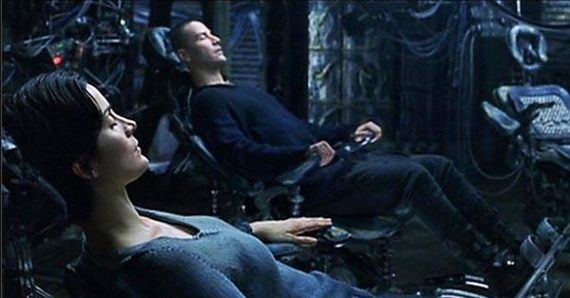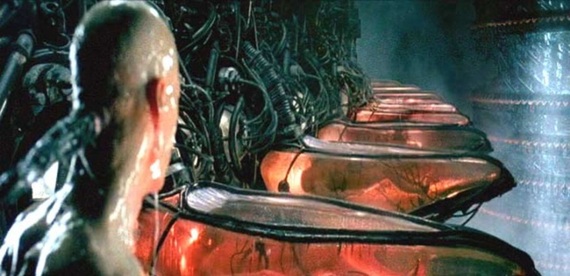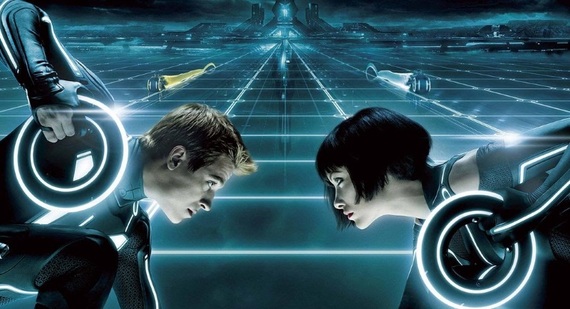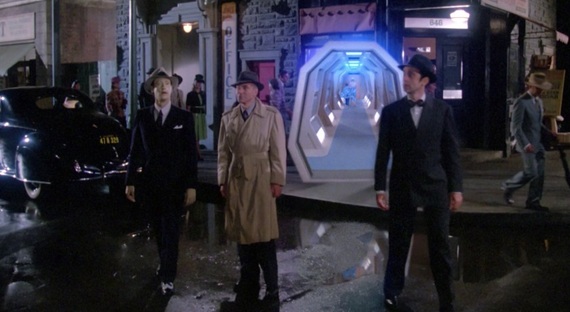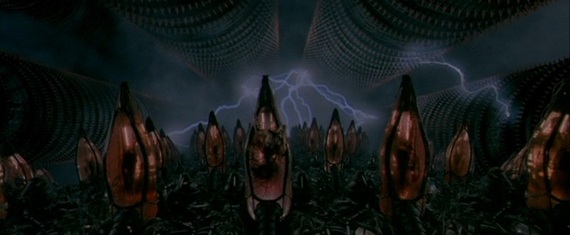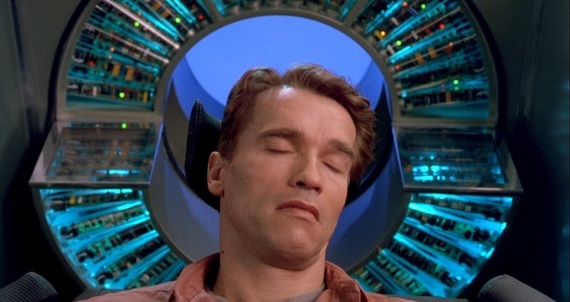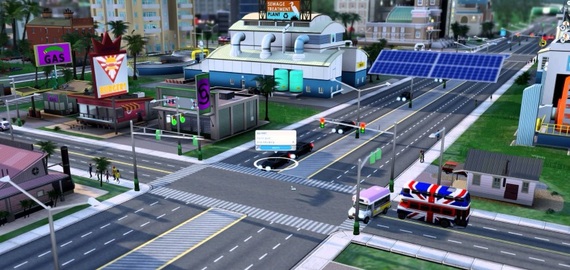This Post originally appeared on the blog ScreenCraft. ScreenCraft is dedicated to helping screenwriters and filmmakers succeed through educational events, screenwriting competitions and the annual ScreenCraft Screenwriting Fellowship program, connecting screenwriters with agents, managers and Hollywood producers. Follow ScreenCraft on Twitter, Facebook, and YouTube.
We’ve all seen the clip and read the headlines of Elon Musk’s shocking declaration that he feels it’s more likely than not that we -- as in humans and every living thing around us -- are living life in a simulation.
"The strongest argument for us probably being in a simulation I think is the following," he told the Code Conference. "40 years ago we had Pong -- two rectangles and a dot. That's where we were… now 40 years later we have photo-realistic, 3D simulations with millions of people playing simultaneously and it's getting better every year. And soon we'll have virtual reality, we'll have augmented reality.”
He went on to conclude, "If you assume any rate of improvement at all, then the games will become indistinguishable from reality, just indistinguishable."
If games and virtual reality would get to that level, "it would seem to follow that the odds that we're in 'base reality' is one in billions," Musk said.
When he was asked for clarification if what he was saying meant that his answer was "yes" to the question of if we were living in a simulation, he said the answer is "probably.”
It’s an interesting and philosophical question that, in lieu of the technological advancement of our times, matches the former age-old rumination that perhaps our life is but a dream or that we’re merely characters in someone else’s imagination or existence.
Perhaps the greatest fictional portrayal of Elon Musk’s argument is 1999’s The Matrix, which showcased a world where the human species -- at least their consciousness -- was actually living in a virtual world while their true physical selves were plugged into the matrix of an advanced Artificial Intelligence that harvested human bodies for energy.
Some within the matrix weren’t even people at all. Some were programs injected into the simulation. Others were viruses.
In another fictional simulated world -- Tron -- the majority were programs downloaded into the grid. Some were controlled by humans outside of the grid in the real world. A select few were physically and mentally uploaded into the system -- their human self digitized.
These types of existential questions have been the basis of great science fiction since the early days of Jules Verne and beyond.
Science fiction has always been a genre that is best defined as movies that often involve speculations based on current or future science and technology. This would disqualify movies that are clearly fantasy -- i.e. Star Wars -- that don't focus on true science, technology, or the speculation of their future likeness.
Star Trek is primarily focused on the speculation of future technology and ideals of science. The franchise even introduced the concept of virtual reality in the sense of realistic simulation close to the extent of what Elon Musk is talking about with the now iconic piece of science fiction -- the holodeck.
So let’s play in Elon Musk’s world. Let’s explore it even further as an exercise in science fiction development.
Let’s assume that Musk is right, and this world as we know it is a simulation. We must then speculate that the creators of this simulation would have a purpose for each and every individual, whether it be the notion that we’re humans with our minds having been uploaded into the “matrix” or we’re each an artificial intelligence programmed into the system.
We’re screenwriters. What purpose would such a group of individuals have in such a simulation?
If We’re Humans Living Out an Existence in a Simulation
We have to differentiate this from being a computer program because the purpose of our existence would be different.
So in this case, we’ll take a cue from The Matrix and assume that for whatever reason, we’re somewhere in a futuristic pod linked to a simulation.
But, our mind only knows this existence.
What would our purpose be as screenwriters?
We can take a cue from the classic science fiction film Total Recall, which involves memory implantation. It’s not an entirely simulated existence, however, the notion of choosing our own adventure could be the launching pad of our simulation.
Perhaps in the future world, outside of the simulation, we’re either on our death bed, terminally ill, or the world as we know it can longer sustain the life we’d like to live. Or perhaps we’re in a space ship making the multiple years-long trip to a distant planet that we were either forced to escape to or were perhaps a group of chosen individuals for a new human colony.
Perhaps we never had a chance to see our screenwriting dreams come true or we wanted something different to experience to kill the time of a multiple year long trip to a planet far, far way.
In this case, our existence in this simulation is likely self-serving. We were likely asked the tough questions of whether or not we want instant success or if we want to cherish that success more by constant rejection and failure for a decade or more of trying. Or perhaps for realistic purposes, the simulation called for natural conflict, forcing everyone to go through the mirrored ups and downs of normal human life in such a scenario -- hence, we must fail, fail, and fail before we can ever prevail.
In that case, we’re living a “The Matrix meets Total Recall” life. And perhaps one day we’ll wake up in our future pods after our simulation has run its course. And then maybe we’ll choose another adventure unless we’ve reached our destination.
If We’re an Artificial Intelligence Program in a Simulation
This notion changes the story quite a bit and is perhaps the most frightening to many.
The idea that we’re not really real is intimidating. Once we get over that shock, we must wonder why we exist in this simulation at all. Why would the creators program us into the world if we didn’t have a purpose?
Here we are as screenwriters living in a simulation. Perhaps it’s a mixed bag of programs like us and actual humans uploaded into the system as we detailed above. In that case, we, the screenwriters, serve a purpose. In a world like this, directors and producers could be the uploaded humans that are using screenwriters as a program. They insert the overall concept into our program (minds) and it is our job to create the screenplay that they will eventually be allowed to direct and produce, using hundreds of other programs in the guise of production designers, wardrobe designers, special effect supervisors, musical score directors, editors, crew, etc.
As a screenwriting program, directors and producers could enter their various thoughts and concepts. To us, in our existence, we see these little scraps of ideas through visuals, fragmented scenes and characters, and even questions that are posed to us in “What if…” form. We -- the ignorant programs that believe we are real human beings -- consider this information as coming from within our own creative subconscious when, in fact, it’s actually coming from outside sources.
This would fall in line with the strange truth of where our ideas come from. We can’t really explain where they come from when people ask us. It starts with a visual, fragmented scene or character, and various “What if…” questions. Or, if we are really a program in a simulation, that’s how we perceive it when we’re really being fed such information by users.
Another option to consider is that all of us are programs. We look at games like Sim City and understand that for whatever reason, it’s entertaining to see a fictional world play out as the controllers of the simulation alter the variables to see what happens.
In this case, screenwriters would once again serve as a program to create fictional stories, perhaps this time with the controllers of the simulation -- we’ll call them Sim-Cons -- at the helm injecting us with ideas to nurture and piece together. Directors and producers would be advanced programs or platforms designed to utilize hundreds of programs to create a work of fiction for the entertainment and curiosity of the Sim-Cons.
Perhaps these Sim-Cons compete against each other in various connected simulations. Some go online to create sporting divisions where they compete against each other to create ultimate teams, which would explain the existence of professional athletes and organizations in the simulation we’re a part of.
And then yes, perhaps there are Sim-Cons that run their own studios and production companies, competing to create the best works of visual fiction.
In that case, screenwriters are but a mere program to piece together information in the form of a screenplay, which would really just be a series of code that other programs can ingest and manipulate through the directives of their own programming.
Lastly, perhaps the Sim-Cons of our simulation are merely studio and marketing executives of the future, playing out various scenarios to see what the end results may be. We all know that Hollywood doesn’t like taking risks. Perhaps thousands of years from now, it’s gotten even more calculated, to the point where they run scenarios in the overall world-wide simulation that we know of as the “real world” to ensure that the projects they green light are viable for a certain fanbase -- in this case obviously those that enjoy the “retro” filmmaking style.
The Possibilities Are Endless
Elon Musk’s thoughts on life and our existence are nothing new. They are simply an evolved philosophical notion that perhaps the reality we know is not the reality that actually is.
From a screenwriter’s perspective, those “What If…” questions are what drives us as either creative human individuals, or programs designed to crack a good tale. Either way, that’s where we find some of the most amazing stories, whether they be in the action, drama, comedy, thriller, horror, or in this case, science fiction genre.
If you didn’t realize it already, this was a writing exercise with that concept as a launching pad. We took the recent popular idea that is topical in current trends now -- Elon Musk’s “life is a simulation” concept -- and started to ask “What if…” questions. We assigned a protagonist -- we the screenwriters -- and played with different scenarios, exploring the many, many possibilities. We may have even seeded a science fiction story or two for all.
That’s what screenwriters need to do. Search for topical subjects, ask “What if…” questions, set the stage(s) or world(s), find protagonist(s), find conflict, and then just let the mind -- or program -- wonder.
If we’ve got your science fiction juices flowing, Enter ScreenCraft’s Sci-Fi Screenplay Contest Now!

